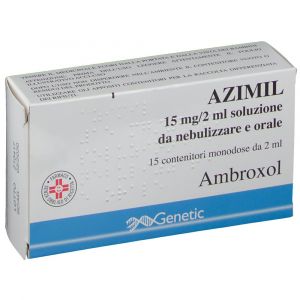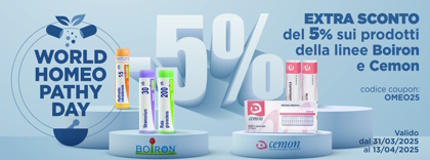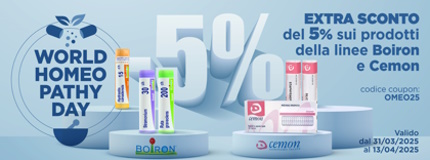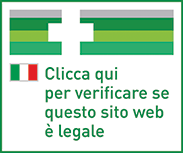Ship in Europe, Find out rates!
Azimil Solution to nebulize 15mg/2ml Ambroxolo Cough 15 vials

- box Delivery in Italy in 24/48 and free returns
- star3.000+ positive reviews
- dropboxOver 60,000 products in the catalog
Solution based on Ambroxol hydrochloride.
Therapeutic indications
Azimil is used in the treatment of secretion disorders in acute and chronic bronchopulmonary affections.
Dosage and Posology
The drug should be taken according to the following doses and methods:
- Adults and children over five years of age: 2 ml (one container) 2 times a day.
- Children under the age of five: 1-2 ml (half a container - one container) 1-2 times a day.
The solution can be administered using normal aerosol therapy devices. It can also be diluted in distilled water in the ratio 1: 1.
Overdose
There are no known cases of overdose with Azimil. The symptoms observed in cases of accidental overdose and / or in cases of medication errors are consistent with the expected side effects of Ambroxol hydrochloride at recommended doses and may require symptomatic treatment. It is advisable to induce vomiting and / or to resort to gastric lavage. Keep in mind that the patient has not ingested other medicines at the same time.
Contraindications
- Hypersensitivity to the active substance or to any of the excipients
- Severe hepatic and / or renal disorders.
- Taking the drug is contraindicated in case of rare hereditary pathologies that may be incompatible with one of the excipients
- The medicine is contraindicated in children under 2 years of age (for oral use)
Side effects
At the recommended doses the medicine is normally well tolerated. The following undesirable effects have been observed during therapy with ambroxol hydrochloride, with frequencies: Very common ≥1 / 10 Common ≥1 / 100 to <1/10 Uncommon ≥1 / 1,000 to <1/100 Rare ≥1 /10,000, <1 / 1,000 Very rare <1 / 10,000 Not known frequency cannot be estimated from the available data
- Disorders of the immune system
- Rare: hypersensitivity reactions
- Not known: anaphylactic reactions, including anaphylactic shock, angioedema and pruritus
- Nervous system disorders:
- Common: dysgeusia (e.g. taste disturbance)
- Rare: Headache
- Respiratory, thoracic and mediastinal disorders
- Common: hypoesthesia of the oral cavity and pharynx
- Not known: bronchial obstruction
- Gastrointestinal disorders:
- Common: nausea
- Uncommon: vomiting, diarrhea, dyspepsia and abdominal pain, dry mouth.
- Not known: dry throat
- Skin and subcutaneous tissue disorders
- Rare: rash, urticaria Not known: severe cutaneous adverse reactions (including erythema multiforme, Stevens-Johnson syndrome / toxic epidermal necrolysis and acute generalized exanthematous pustulosis).
Pregnancy and breastfeeding
Ambroxol hydrochloride crosses the placental barrier. Animal studies have shown no direct or indirect harmful effects on pregnancy, embryonal / fetal development, parturition or postnatal development. Clinical studies and extensive clinical experience after the 28th week of pregnancy have shown no evidence of harmful effects on the fetus. However, it is recommended to observe the usual precautions regarding the use of medicines during pregnancy. Particularly during the first trimester, the use of Azimil is not recommended. Ambroxol hydrochloride is excreted in breast milk. Although no adverse effects on nursing infants are anticipated, the use of Azimil is not recommended in nursing mothers.
Special warnings
Mucolytics can induce bronchial obstruction in children less than 2 years of age. In fact, the drainage capacity of the bronchial mucus is limited in this age group, due to the physiological characteristics of the respiratory tract. They should therefore not be used in children less than 2 years of age (for oral use, see section 4.3). Azimil should be administered with caution in patients with peptic ulcer. There have been reports of severe skin reactions such as erythema multiforme, Stevens-Johnsons syndrome (SJS) / toxic epidermal necrolysis (TEN) and acute generalized exanthematous pustulosis (AGEP) associated with administration of Ambroxol. If symptoms or signs of progressive skin rash (sometimes associated with blistering or mucosal lesions) are present, treatment with Ambroxol should be stopped immediately and a physician consulted.
Most of these cases can be explained by the severity of the patient's underlying disease and / or by concomitant therapy. Also, during the early stage of Steven-Johnson syndrome or toxic epidermal necrolysis (NET), patients may initially experience nonspecific flu-like prodromes such as fever, body aches, rhinitis, cough, and sore throat. Due to these misleading nonspecific flu-like prodromes it is possible that symptomatic treatment with cough and cold medicines may be instituted. Therefore, if new lesions of the skin or mucous membranes occur, it is necessary to consult a doctor immediately and to stop the treatment with ambroxol hydrochloride as a precaution. In the presence of mild or moderate renal insufficiency or severe liver disease, Azimil should only be used after consulting your doctor. As with any medicinal product with hepatic metabolism followed by renal elimination, accumulation of the metabolites of ambroxol generated in the liver may occur in severe renal insufficiency.
During the administration of the solution to be nebulized, since coughing from irritation may arise in the too deep inhalation of the aerosols, one should try to inhale and exhale normally. In particularly sensitive patients, a preheating of the inhaled to body temperature may be recommended. For patients suffering from bronchial asthma it is advisable to resort to a bronchial spasmolytic before inhalation.
Azimil syrup in single-dose container and in multi-dose bottle contains maltitol: patients with rare hereditary problems of fructose intolerance should not take this medicine. Azimil syrup in multidose bottle contains para-hydroxybenzoates which can cause allergic reactions (including delayed type).
Expiry and retention
Check the expiration date indicated on the package. The expiry date indicated on the package refers to the product in intact packaging, correctly stored. This medicinal product does not require any special storage conditions. After opening the foil pouch containing the single-dose containers, the medicine must be used within three months; after this period, any unused medicinal product should be discarded. When using half a dose of the single-dose container, the closed container must be stored at 2 ° - 8 ° C (in the refrigerator) for a maximum of 12 hours; after this period the residual medicinal product must be discarded. After opening the syrup bottle, the medicine should be used within one month; after this period the residual medicinal product must be discarded.
Warning : do not use the medicine after the expiry date indicated on the package.
Composition
A single-dose container of Azimil contains:
Active principle
Ambroxol hydrochloride 15 mg
Excipients
Sodium chloride, Water for injections


